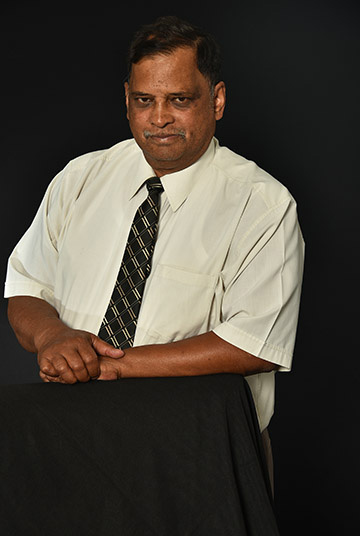News & Events
Research must be inspired to bring about improvement in the condition of humankind
The National Research Foundation (NRF) recently awarded Professor Noor Davids a C2 rating for his established and impactful research work in Historical cosmopolitanism: towards a post-apartheid theory of ‘cosmubuntism’. The NRF rating system is a key driver in the NRF’s aim to build a globally competitive science system in South Africa. It is a valuable tool for benchmarking the quality of South Africa’s researchers against the best in the world. The ratings are allocated based on a researcher’s recent research outputs and the impact thereof, as perceived by international peer reviewers.
Davids’s C2 rating acknowledges him as an established researcher with a sustained recent record of productivity in his field of research. Expressing his sentiments about the rating, he says that any NRF rating is a prestigious achievement in the South African academic community, adding: “I am proud of my C2 rating. Considering the rigorous process that a rating application must go through, to me, an NRF rating generates confidence in scholarship and research competence.”

Professor Noor Davids
Davids further explains that an NRF rating is also a validation of an individual’s contribution to knowledge and an inspiration to do further research. He elaborates: “It is a motivation to my colleagues, who show interest in sharing and advancing their research. It is commendable that Unisa’s Research Directorate offers support during the application process until the submission of the application. While I realise that an NRF rating is the first step towards academic excellence, new horizons are set for the future. An NRF rating is both celebratory and humbling: one realises that research is a life-long journey towards self-improvement and living a worthwhile life, to cite the sage of knowledge – Socrates.”
A keen interest in education
Davids’s field of research is broadly in education. He specifically began his research in teacher education, with an interest in HIV/AIDS, the history of education and contemporary historical issues. He explains: “I am also a challenging researcher, with an interest in all social issues relevant to education. I recently published on the history of pandemics, xenophobia and historical memory from a history education perspective.”
Davids has contributed through research substantially in forced removals during apartheid. “With declining interest in history as a discipline, South Africa’s fledgling democracy seems to be suffering from historical amnesia, as evidenced by an arguably poor national sense of historical memory,” says Davids. “My research started with recoding learners and adult memories of forced removals in District Six. This theme journeyed through all the major South African urban spaces such as South End (Eastern Cape), Fietas, and Sophia Town (Gauteng) as well as Lady Selbourne (Pretoria), to mention a few, that became the basis of a new, decolonised theory of cosmopolitanism,” he adds.
Davids traced an ubuntu-inspired cosmopolitanism in precolonial indigenous Khoi-San society that became the nucleus of pre-apartheid urban life that the National Party (white minority) was determined to destroy. With the realisation that post-apartheid South Africa lacks social cohesion, Davids is of the view that the ideal of a non-racial, free and equal society must be kept alive. “My research culminated in a new theory of ‘cosmubuntism’ that creates space and recognition for our culturally diverse citizenry. My rationale is that if blacks and whites could live together as neighbours before apartheid, it is possible to live together in a post-apartheid society. However, for this theory to find traction, the voices of all South Africans, irrespective of race, colour or creed need to be heard. As the older generations with memory of pre-apartheid social cohesion are passing on, it will be our research archives that will make these ideals accessible to future generations,” he asserts.
Inspiration
Davids’s research interest is guided by the need to develop a relevant and meaningful curriculum through transformative and responsive pedagogy. He explains that he has always been inspired by a famous philosopher and historian, who said that philosophers have been preoccupied with interpreting the world, whereas the point is to change it. “Research must be inspired to bring about improvement in the condition of humankind and it is an esteemed value that should be promoted from the cradle to the grave,” he says.
According to Davids, there is a lack of critical historical researchers that work in a transformational paradigm to effect change in social consciousness through education, as well as a lack of educational interest to support a new vision to make history a compulsory subject at school; all these factors inspire Davids’s research work.
Among his research highlights and achievements, Davids is a recipient of the 2019 Unisa Chancellor’s Award for excellence in research, the Gold Award for Excellence in Research from the Cape Peninsula University of Technology (2015), an International Award for Excellence: Common Ground publication (2018) and, an NRF C2 rating as an established researcher (2021–2026).
Unisa is the home of established researchers like Davids, whose research outputs push the boundaries and inspire new ways of thinking.
*By Tshimangadzo Mphaphuli, senior journalist, Department of Institutional Advancement
Publish date: 2021/07/21
